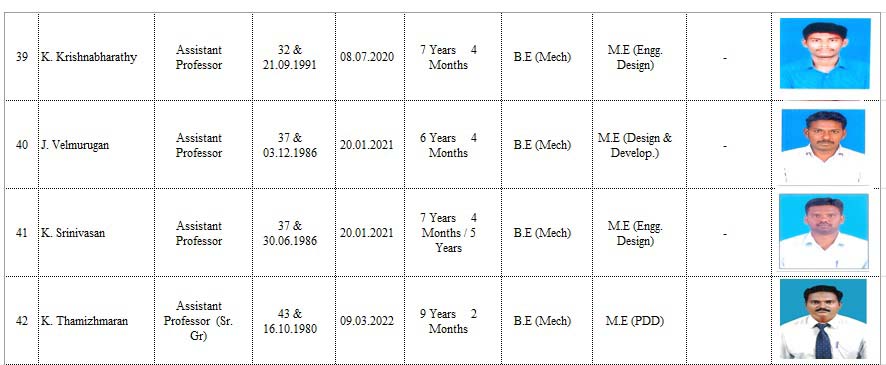Mechanical Engineering
VISION
Our goal is to become a global knowledge hub for excellence in Mechanical Engineering education, fostering entrepreneurship and innovation, and becoming a leading center of excellence in the field.
MISSION
The aim is to provide quality education through hi-tech teaching and collaboration, mold young professionals, achieve national top ten rankings, meet international standards, improve communication skills, foster teamwork, enhance social standards, and enhance students’ research activities.
Programme Educational Objectives (PEOs)
- To foster our young graduates with sound technical knowledge so as to make them employable.
- To apply the learned knowledge in the field of Mathematics, Science and Engineering in real time applications.
- To design a system, component or process to meet the desired needs within realistic constraints such as manufacturing, economy, environmental sustainability, social, ethical, health and safety.
- To prepare the students to become multi-dimensional entrepreneurs with professional attitude in the broader social perspective.
- To craft curiosity among students for life-long learning through self-study.
Programme Specific Objectives (PSOs)
The Graduates B. Tech Mechanical Engineering will be able to
- To prepare students for further study and research in their chosen profession, as well as to use a solid foundation in the fundamental sciences—mathematics, physics, and chemistry—for the purpose of analysing engineering problems
- Apply rational ability in analysing real time problems, and use professional and ethical behaviours to provide absolute solutions to the complications.
Programme Outcomes (POs)
- Engineering knowledge: Apply the knowledge of mathematics, science, engineering fundamentals, and an engineering specialization to the solution of complex engineering problems.
- Problem analysis: Identify, formulate, review research literature, and analyse complex engineering problems reaching substantiated conclusions using first principles of mathematics, natural sciences, and engineering sciences.
- Design/development of solutions: Design solutions for complex engineering problems and design system components or processes that meet the specified needs with appropriate consideration for the public health and safety, and the cultural, societal, and environmental considerations.
- Conduct investigations of complex problems: Use research-based knowledge and research methods including design of experiments, analysis and interpretation of data, and synthesis of the information to provide valid conclusions.
- Modern tool usage: Create, select, and apply appropriate techniques, resources, and modern engineering and IT tools including prediction and modeling to complex engineering activities with an understanding of the limitations.
- The engineer and society: Apply reasoning informed by the contextual knowledge to assess societal, health, safety, legal and cultural issues and the consequent responsibilities relevant to the professional engineering practice.
- Environment and sustainability: Understand the impact of the professional engineering solutions in societal and environmental contexts, and demonstrate the knowledge of, and need for sustainable development.
- Ethics: Apply ethical principles and commit to professional ethics and responsibilities and norms of the engineering practice.
- Individual and team work: Function effectively as an individual, and as a member or leader in diverse teams, and in multidisciplinary settings.
- Communication: Communicate effectively on complex engineering activities with the engineering community and with society at large, such as, being able to comprehend and write effective reports and design documentation, make effective presentations, and give and receive clear instructions.
- Project management and finance: Demonstrate knowledge and understanding of the engineering and management principles and apply these to one’s own work, as a member and leader in a team, to manage projects and in multidisciplinary environments.
- Life-long learning: Recognize the need for, and have the preparation and ability to engage in independent and life-long learning in the broadest context of technological change.
Faculty Profile


